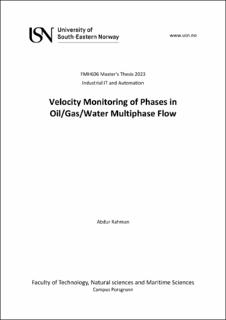Velocity Monitoring of Phases in Oil/Gas/Water Multiphase Flow
Master thesis
Permanent lenke
https://hdl.handle.net/11250/3073038Utgivelsesdato
2023Metadata
Vis full innførselSamlinger
Sammendrag
Machine learning and deep learning techniques have gained significant attention in recent years for enhancing the precision and efficiency of velocity estimation in multiphase flow. This thesis aims to achieve three objectives: predicting the flow rate of multiphase flow using only accelerometer data from four installed accelerometers in Equinor's test rig, creating spectrograms from accelerometer data and then train a CNN (Convolutional Neural Network) model for flow type identification, and exploring the possibilities of applying physics-based machine learning in case of flow rate predictions of multiphase flow using only accelerometer data.
The results are promising in predicting flow rate and classifying flow types using machine learning techniques. However, the denoising process applied was assumed to be effective, and a more reliable and accurate denoising process for filtering out the noise in the accelerometer data caused by the installed Coriolis meter is necessary for future studies. The study has demonstrated the potential to predict flow rate using fewer than all four accelerometers. However, the models' proficiency is linked to the number of samples available for training. It is worth noting that more samples are required for single-phase flows to further improve the accuracy of the model.
The thesis has successfully demonstrated that accelerometer data from Equinor test rig contains the information to predict multiphase flow rate and to identify flow types of multiphase flow utilizing machine learning techniques. Moreover, the study has shown the potential use of physics-based machine learning in the case of making predictions of multiphase flow rate.
